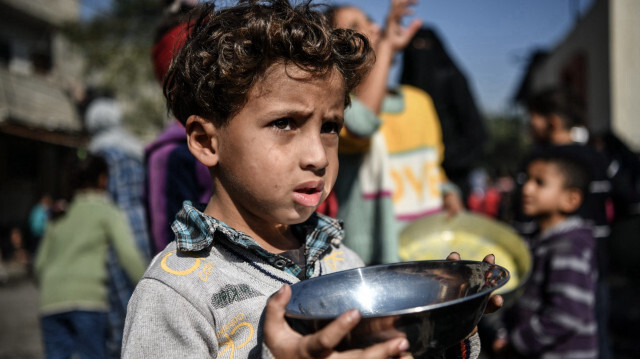
With the break of dawn, Palestinian Abu Qusay Abu Nasser, 44, woke to the screams of his children, who were suffering from intense hunger due to food shortages in their home in northern Gaza.
Full of profound sorrow as he sees his children suffer from starvation, Abu Nasser was unable to find a quick solution to feed them amid the ongoing Israeli blockade and war that exacerbate the suffering of the people.
This situation compelled Abu Nasser to head towards a meager market of in the Jabalia refugee camp in northern Gaza in search of food for his family.
He passes by vendors displaying their vegetables -- some of which appear to be moldy -- scanning left and right, hoping to find anything that could help him feed his hungry children.
The father, bearing signs of fatigue on his face, seeks to find dried corn and barley, which are considered animal fodder in Gaza.
Abu Nasser, with a hopeful expression, looks forward to preparing bread from these ingredients after wheat supplies have run out in the northern part of the territory.
One of the vendors laid out a bag of potatoes showing signs of decay. Abu Nasser and the passersby hurry toward him, hoping to purchase something they could use to meet their essential needs.
"Since early morning, I've been out searching for food, corn, and barley to feed my hungry children," Abu Nasser told Anadolu.
"Since yesterday, I've only eaten one date, and the children are crying out from hunger. I don't know what to do," he added.
He went on: "I went to the Jabalia market, but I could not find the dried corn meant for animal fodder to make bread."
Abu Nasser pointed out that "since the week-long pause in Gaza, nothing has reached the northern part of the territory, and what arrives barely meets the needs of Gaza City, let alone the north."
On Dec. 1, 2023, a one-week temporary humanitarian pause between Hamas and Israel, mediated by Qatar, Egypt, and the US, ended.
The pause saw prisoner exchange and limited humanitarian aid in the Gaza Strip, home to more than 2.3 million Palestinians.
Abu Nasser explained that he resorted to consuming Khubbayza (malva) a type of wild green herb, but the influx of people to agricultural lands made it unavailable.
"Does the Israeli occupation punish us by not providing food and drink? Is it because we have not all fled to the southern Gaza Strip?" he wondered, urging Arab and Muslim nations to look at the people of Gaza with compassion.
Rawiya Rizq, a Palestinian woman who sought refuge in one of the schools in the Jabalia camp in northern Gaza, said: "There is no food, and we are living in famine."
"We are consuming animal fodder, which is running out, and diseases are spreading rapidly. Children are suffering from measles and hepatitis, while adults are struggling with diabetes and high blood pressure," she added.
Rizq explained that animal fodder is scarce and expensive, with the price of three kilograms ranging from 60 to 80 shekels ($219-$292).
According to recent UN malnutrition screening results, the overall acute malnutrition rate among children aged 6-59 months in Gaza has significantly increased to 16.2%, exceeding the critical threshold of 15% set by the World Health Organization.
Israel has launched a deadly offensive on the Gaza Strip since an Oct. 7 cross-border incursion by the Palestinian group Hamas, killing more than 29,700 people and causing mass destruction and shortages of necessities, while nearly 1,200 Israelis are believed to have been killed.
The Israeli war on Gaza has pushed 85% of the territory's population into internal displacement amid acute shortages of food, clean water, and medicine, while 60% of the enclave's infrastructure has been damaged or destroyed, according to the UN.
Israel stands accused of genocide at the International Court of Justice. An interim ruling in January ordered Tel Aviv to stop genocidal acts and take measures to guarantee that humanitarian assistance is provided to civilians in Gaza.
Hostilities have continued unabated, however, and aid deliveries remain woefully insufficient to address the humanitarian catastrophe.













